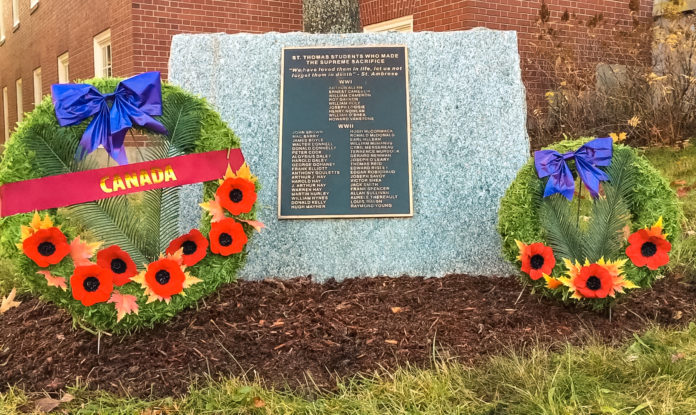

Throughout his career as a writer, St. Thomas University English professor Stuart Donovan has honoured the legacy of his father, a former soldier, by remembering the war through poetry.
“I don’t know who drove you down from Sydney, Dad, that summer of ’45 hardened D-Day veteran 20 years old,” he wrote in his poem Cape Smokey. “There is no freedom from nostalgia. It wounds us and heals us and wounds us again.”
In August 1943, Leo Donovan was drafted in the Royal Canadian Army Service Corps, Mechanical Division. In June 1944, he landed at Juno Beach, France as part of the Normandy Invasion and later fought in Belgium, Holland and Germany. He returned home to Cape Breton, Nova Scotia, but never forgot the experience of war. He died in March 2020 at the age of 96.
Donovan said he comes from a family directly affected by the demands and sorrows of war. Most of the men in his family were away at war. He said understanding history helps people to avoid repeating mistakes.
Due to the pandemic, New Brunswickers couldn’t celebrate Remembrance Day together. But Jeffrey Carleton, associate vice-president of communications, and Jacqueline Cormier, communications officer at STU, came up with the idea to celebrate online so everyone could cherish the memory of their loved ones.
Carleton said STU would normally have a ceremony on campus at the memorial next to Vanier Hall, which has the names of students killed during the first and second World Wars.
“It’s always a very important ceremony. Students come and take a moment of silence to remember and reflect,” said Carleton.
Poetry will be a central feature of STU’s online Remembrance Day ceremony on Nov. 11.
The ceremony will include two videos from Donovan. One is him reading his poems while the other speaks about the meaning behind them. There’s also a video of Maj. Stephen Brosha, who graduated from STU in 2006 with a bachelor of arts and was a Rhodes Scholar. He is now a major in the air force.
“From the fields of Normandy to the mountains of Afghanistan, young Canadians have long fought for the ideals we share,” said Brosha. “They are worthy of remembering.”
Some poets, like Wildfred Owen, saw it as their duty to write about the “grim reality” of the First World War through poems like Anthem for the Doomed Youth, according to a History article.
Donovan believes in the power of poetry to tell the stories that must pass to the next generations.
“There are not so many war poems about the war, battling in the trenches and the troops, but about the political and cultural impact that the mothers left behind [when the men left for war],” said Donovan.
“We can’t leave them to the contempt of posterity.”
